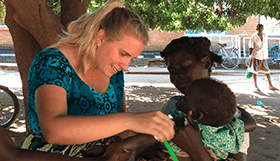2010 Forward under 40 Award Honoree
UW Major: Psychology and Medicine
Age: 37 | Madison, Wisconsin
Medical Director of Adult Services, Rogers Memorial Hospital of Oconomowoc; Clinical Assistant Professor of Psychiatry, UW-Madison and Medical College of Wisconsin
"I have seen our interventions make patients capable of living the lives that they have dreamed of but have been unable to live due to crippling psychiatric illness."
As a cancer survivor, Jerry Halverson knows firsthand the importance of quality, patient-centered health care. It's a philosophy he's put into practice to impact the lives of countless patients with mental illness.
When he's not researching life-saving technologies to provide best practice-driven clinical care, he advocates tirelessly for mental health parity, quality medical care, health system reform and expanded research on and funding for mental health treatments for severely mentally ill patients.
First as medical director of Meriter Hospital's Adult Psychiatric Unit and now as Rogers Memorial Hospital's medical director of adult services, Halverson helps to develop life-changing interventions for those who are suffering from the most severe forms of psychiatric illness, including depression, suicidality and obsessive-compulsive disorder.
"Mental illnesses are physical disorders," says Halverson, who warns of the destructive stigma and discrimination patients with mental illness confront on a daily basis. "They are not something different and less important. Five out of the top 10 causes of disability worldwide are psychiatric illnesses."
Halverson studies the emotion circuit of the brain to develop interventions to improve lives for some of the area's sickest patients – those suffering from severe, treatment-resistant psychiatric illnesses. The treatments he has been researching include vagus nerve stimulation (VNS), direct cortical stimulation (DCS) and deep brain stimulation (DBS) therapies. Each use an impulse generator implanted in the chest that delivers electric pulses over regular intervals into an area of the brain that appears to affect mood, in contrast to electroconvulsive therapy (ECT), which sends higher-current shock across the entire brain, and thus leads to more side effects.
VNS is a process that sends electricity directly into one of the major nerve pathways that connect to the patient's brain. In DCS, the impulse generator is connected to the outer layer of the brain, and in DBS, the device is connected to yet a different area in the inner depths of the brain. Due to the risks of these therapies, Halverson only recommends these treatments for people who have failed to show sustained improvement with at least four other interventions – medications, psychotherapy, ECT or a combination of these treatments. VNS, DCS and DBS therapies show tremendous promise, but Halverson warns that "we still have much to learn about all of these modalities" and they are generally only available under research protocols.
Recognized among his peers as a leader, Halverson has been tapped for numerous professional appointments, including Dane County Medical Society president, Wisconsin Medical Society board member and Wisconsin Psychiatric Association executive council member. He was recently recognized for his peer leadership and patient advocacy with an early career Leadership Award from the American Medical Association.
"I have participated in committees and assemblies at the county, state and national levels to advocate for the highest quality care for our patients and to bring what has worked well in Madison to the Capitol dome and beyond," he says. "The rest of the country can learn from what we do in Wisconsin."
Directly or indirectly through political advocacy, research and treatment, Halverson has affected the lives of countless patients with mental illness.
"The change in my life was unbelievable," says one recent patient. "I felt depression-free, which I had never felt before, since I have been suffering with depression since childhood. I always feel comfortable working with Dr. H. He has a quiet voice and a confidence that reassures me that he is doing all he can to help me."




